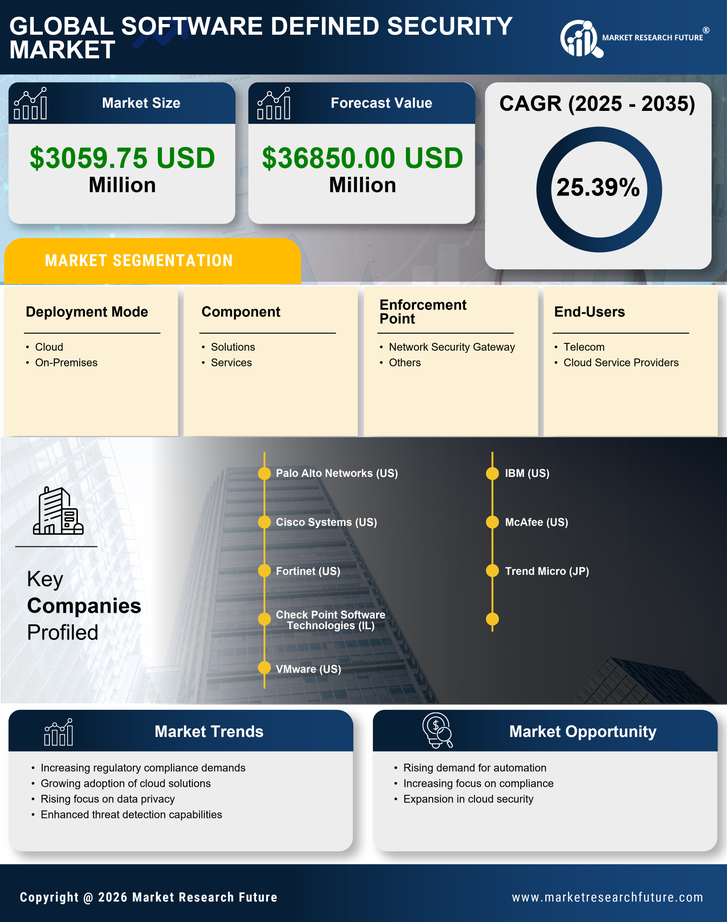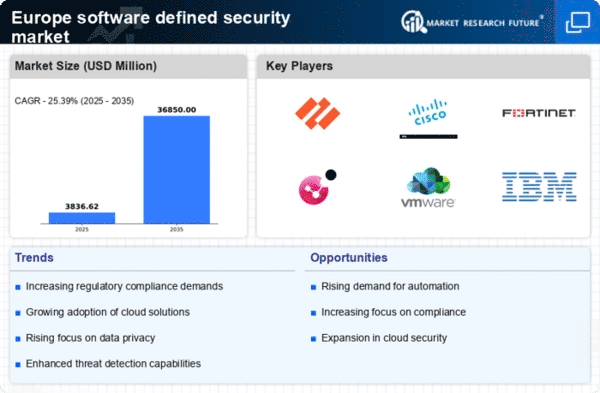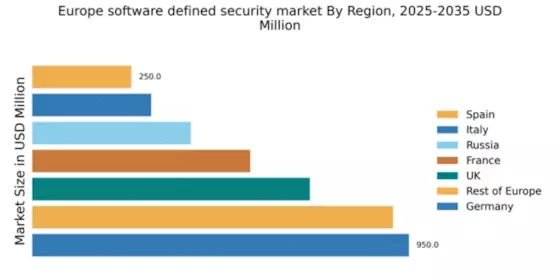Rising Cyber Threat Landscape
The software defined-security market in Europe is experiencing a notable surge due to the escalating cyber threat landscape. As organizations increasingly rely on digital infrastructures, the frequency and sophistication of cyberattacks have risen dramatically. Reports indicate that cybercrime costs European businesses over €140 billion annually, prompting a heightened focus on security solutions. This environment compels enterprises to adopt software defined-security measures that offer dynamic protection against evolving threats. The need for real-time threat detection and response capabilities is paramount, as traditional security measures often fall short. Consequently, the The software defined security market is likely to expand. Organizations seek to fortify their defenses against a backdrop of increasing vulnerabilities.
Shift Towards Remote Work Models
The transition to remote work models across Europe has significantly influenced the software defined-security market. With a substantial portion of the workforce operating from home, organizations face unique security challenges that necessitate robust solutions. The demand for secure access to corporate resources has surged, leading to an increased reliance on software defined-security frameworks. According to recent studies, approximately 60% of European companies have reported security breaches related to remote work. This trend underscores the necessity for adaptive security measures that can protect data and applications regardless of location. As businesses continue to embrace flexible work arrangements, the The software defined security market is poised for growth. This growth is driven by the need for comprehensive security strategies.
Increased Investment in Digital Transformation
The ongoing digital transformation initiatives across Europe are propelling the software defined-security market forward. Organizations are investing heavily in technology to enhance operational efficiency and customer engagement. In 2025, it is projected that European enterprises will allocate over €200 billion towards digital transformation efforts. This investment often includes the integration of advanced security solutions to safeguard digital assets. As businesses adopt cloud services, IoT devices, and other digital tools, the complexity of their security needs increases. Software defined-security solutions provide the necessary flexibility and scalability to address these challenges, making them an attractive option for organizations navigating the digital landscape.
Regulatory Pressures and Compliance Requirements
The software defined-security market in Europe is significantly influenced by regulatory pressures and compliance requirements. With stringent data protection regulations such as the General Data Protection Regulation (GDPR) in place, organizations are compelled to implement robust security measures. Non-compliance can result in hefty fines, reaching up to €20 million or 4% of annual global turnover, whichever is higher. This regulatory environment drives businesses to adopt software defined-security solutions that ensure compliance while protecting sensitive data. As regulations evolve, the demand for adaptable security frameworks that can meet these requirements is likely to increase, further fueling market growth.
Emergence of Advanced Threat Intelligence Solutions
The emergence of advanced threat intelligence solutions is reshaping the software defined-security market in Europe. Organizations are increasingly recognizing the value of proactive threat intelligence in identifying and mitigating potential risks. By leveraging data analytics and machine learning, these solutions provide insights into emerging threats, enabling businesses to stay ahead of cybercriminals. The market for threat intelligence is expected to grow by over 30% in the coming years, reflecting the increasing importance of informed decision-making in security strategies. As companies seek to enhance their security posture, the integration of threat intelligence into software defined-security frameworks is likely to become a standard practice, driving further market expansion.


















